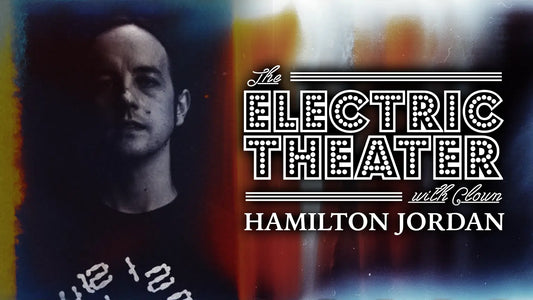Revered multi-instrumentalist, accomplished composer, versed musician, and in-demand producer Dev Hynes, aka, Blood Orange, sat in for a discussion with clown on the latest installment of the The Electric Theater.
A creative contributor that has had a profound impact on the contemporary climate of music, Hynes' ability to challenge expectations and blur genre lines has made him a force that has permeated throughout the sphere of music as well as film and television - which as of late has consumed his workload.
Curious to find out how such a colossal talent was nurtured, clown began the conversation with an inquiry about reward - asking Hynes just how much encouragement he received as a youth that had such an artistic inclination.
The musician would reveal that the reward he found in music was his retreat. He shared that his connection with the medium provided a sense of escapism that he kept stashed. A respite from the rigors of being bullied in school and keeping up appearances in playing sports, Hynes explained that his head was always fixed on the moment he could skate home, get back to his room, and get lost in the music.
It's a sentiment that Hynes still maintains to this day. Though he is more a contributor than a spectator, that emotional comfort of music is something he takes ownership of and feels he needs to protect. It's that same reverence that likely plays such a crucial role in Hynes ability to be so versatile. His personal connection to the craft is such that he defends it - an ideology that clown aligned with completely.
Both artists would then trade some of their more formative experiences with regards to being nourished early on as creative people. clown talked about his mother really fostered an environment that allowed him to explore art at his own pace - even if it meant allowing him to dive into material that maybe wasn't especially age appropriate.
Hynes would share two particular instances that were especially important to him. As a teenager, he began playing cello and while his family couldn't afford one, his mother did all she could to ensure that he was able to at least rent one from school. As for his father, Hynes paint a very stoic picture, which is likely why this particular story was so formative for Hynes.
He recalled that when he was 17, his father brought home the second album from Slipknot, 'Iowa' to give to his son. Hynes shared that the moment was so vivid, so important - not only was his father nurturing his passion, but he did so in a way that showed he was paying attention to the where his son was creatively in that moment and time.
The conversation would then pivot into a dissection of the term "pop". Given Hynes' ability to blur genres and work outside of the confines of any category, there is often a catch-all of "pop" heaved his way. clown asked Hynes how he felt about that term given the stigma it's generic brushstroke.
Hynes would explain that how people choose to define him is not something he chooses to consider much. It's just not something that broaches his consciousness. Though Hynes did acknowledge how pop can be pedestrian, he opts to define pop as catchy, memorable, melodic music - something memorable enough to sing along to. While there is plenty of cliche that can weigh some pop down, that blanket term doesn't take into account anomalies like Blood Orange who transcend the genre.
As for the endgame and Hynes creative goal, the focus is always on exploration. Discussing his penchant for collaboration projects, Hynes shared that he feels like his skill set and his personal preference might not align well enough to please the masses. He shared that in being able to collaborate with people from the world of pop affords a stylistic marriage that allows him to venture into new creative spaces in a way that compliments the music, not compromises its quality.
Naturally the conversation would touch on the current climate and the bizarre reality that is life during a global pandemic. When it comes to actively scratching that creative itch, Hynes confided how his work in scoring for film and television allows him to make music everyday.
Explaining how that avenue taps into a different part of the brain, Hynes also shared that while he wants to dig into his own music, it's not something he is willing to force. Allowing that channel to open naturally, Hynes has intentions of getting back to more of his own brand, but is allowing that creative process to happen organically rather than forcing it.
In the meantime, Hynes workload with his compositions is occupying plenty of his artistic bandwidth. He has scored the music for the 2020 HBO series 'We Are Who We Are' and has since been tapped to the do the music for the network's return of the series 'In Treatment' after a 10-year hiatus. Hynes also scored the Rebecca Hall directorial debut that made waves at this year's Sundance Festival in the feature film, 'Passing'. He is also working on music for three part documentary with Garret Bradley whose resume includes the award-winning, critically lauded documentary, 'Time'.
Functioning currently as a commissioned artist, Hynes finds creative fulfillment with his work in scoring for the screen, but points out that there is the asterisk of it being work initiated by someone else. In having such a personal connection to the craft, when Hynes opts to release something of his own, it's not something seems willing to connect with the deadline - you can't rush greatness and when it comes to anything Blood Orange, good things come to those who can wait.
Stream the complete interview below.
Subscribe to the Podcast on your favorite platform
Latest on KNOTFEST.com




